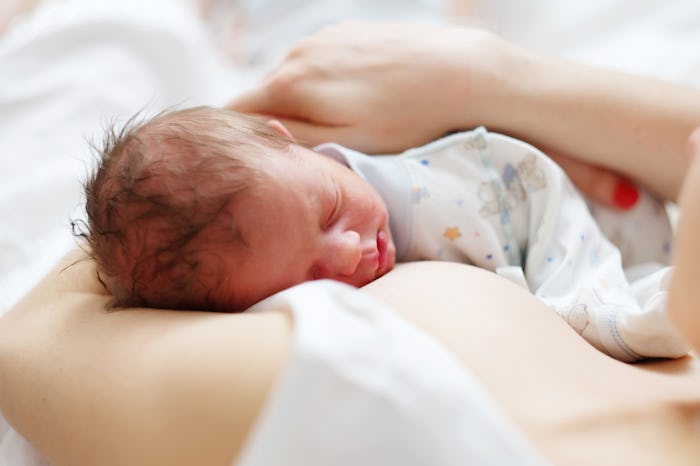"Mommy brain" sounds made up, but anybody who's been a parent for more than 10 minutes can attest to the truth behind it — parenting turns your brain to mush. The lack of sleep, the constant worrying, and the endless list of things to remember can really do a number on your gray matter, but each individual aspect of raising a little one can affect your brain, too, like breastsleeping. But what does breastsleeping do to your brain?
Breastsleeping isn't a new phenomenon, so the affects on a mother's brain aren't exactly some kind of unheard of reality. Dr. Cecilia Tomori, anthropologist with postdoctoral training in public health, Research Associate at the Johns Hopkins Bloomberg School of Public Health, and author of Nighttime Breastfeeding: An American Cultural Dilemma, tells Romper that the concept of breastsleeping reflects what "we know about the evolutionary context of human infant feeding and sleep." Tomori notes that it's essential to think about the selection pressures, like natural selection, in our evolutionary history that are at play. "We need to consider breastsleeping and all the complex physiological interactions in this concept as adaptations that ensured the survival of human infants," she says.
Sounds super scientific, but it's actually incredibly natural and instinctive. Because of the physiological interactions happening during breastsleeping, your brain is actually becoming an integral part of your baby's safety and their sleep. By breastfeeding and sleeping with your baby, your brain becomes physiologically attuned to your baby, according to Tomori. Your brain can help regulate your little one's heart rate, temperature, sleep cycle, and breathing, just by being closer to them. It can also make you more aware of your little one and more alert, as long as your brain isn't being impaired in any way, like with alcohol or medications.
But breastsleeping can do something else to your brain — it can keep it healthy. According to Tomori, breastsleeping moms get more sleep than those who don't breastsleep. She notes that more sleep is precisely because of the physiological coordination between moms and babies in the context of breastsleeping. "For instance, many moms who breastsleep report, and this has been observed though nighttime video observations as well, that they are not fully awake during these feedings," Tomori says. "They don’t have to get out of bed and pick up the baby, who is often already quite hungry, to feed them, nor do they have to try to soothe the baby back to sleep after each feeding. This maximizes rest for both mom and baby. This is actually the primary reason why so many parents adopt this practice in the first place, without necessarily intending to do so."
And more sleep? That means a healthier brain. According to Harvard, sleep is essential for good brain health and not getting enough of it can affect your memory, mood, motivation, judgement, perception of events, and even your learning. Breastsleeping can help make sure you get enough of those Zs so you don't forget who you are, what you're doing, or that your cellphone is on top of the car after you buckle your kid into their seat.
Breastsleeping gives you mom brain, but in the best possible way — it keeps your brain more alert to your little one's needs and survival and it gets enough sleep so you can be the best version of yourself to your baby in the morning. Now, what all those hours of Daniel Tiger's Neighborhood do to your brain? The jury's still out.
